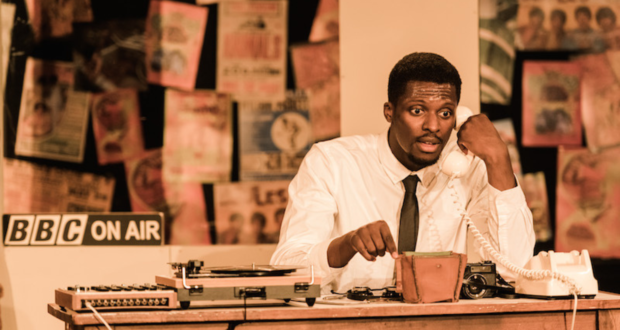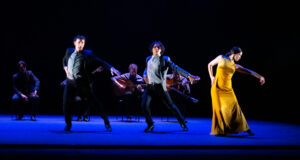An uplifting and infectious performance which fuses storytelling with music and dance to explore the experience of Ghanian immigrants in 1960s London.Summary
Rating
Good
As the play starts, radio broadcaster Mike Eghan (Benjamin Sarpong-Broni) is purposefully arranging his radio studio. He takes particular care of the BBC sign, which he moves several times to maximise attention, and lovingly takes out vinyl records to play music, changing tunes and dancing along. He’s waiting for an important visitor, who arrives in the form of the photographer James Barnor (Joshua Roberts-Mensah). Barnor is there to take Eghan’s photo for the music magazine Drum, of which Eghan is a big fan. Eghan is keen to impress the photographer, but Barnor admits he’s never even listened to the radio show: he’s just there to take photos. The broadcaster is proud of his show, which celebrates African music twice a week – on the BBC airwaves no less! – and is undermined by Barnor’s admission: it’s not a great start to the relationship.
Both men are Ghanian but have very different attitudes with regard to their assimilation into London and their views of returning home. With the play set in the 1960s, the Ghanian coup is an inflammatory topic and the two trade opposing views about the NLC and Kwame Nkrumah, leader of the civilian government. Barnor has swagger and confidence: he’s only in London for a short period of time and is determined to go back home to serve his country. Eghan is less sure: he is careful about how he dresses and wants to fit in. He has as a wife and son, believes his home is London now and is teased for his trans-Atlantic accent. Barnor suggests Eghan is privileged. Eghan objects.
What follows is a really interesting, often funny, uplifting and infectious performance as the two debate life, love and politics. Music permeates the piece adding colour and rhythm, and at times the two break out into dance, which is just joyous. Highlife music is a character in its own right and the two sing and celebrate popular Ghanaian songs, which the audience join in with. Barnor teases Eghan for playing the Beatles, but then joins in anyway. It’s also informative: the nuance of Ghanian identity and culture in comparison to the rest of Africa is clear as they discuss food growing up and trade proverbial wisdoms. Both actors inhabit their characters well and perform confidently.
Designer Constance Villemot has carefully recreated the 1960s with a set that is full of accurate touches. It beautifully generates nostalgia for those old enough to remember.
There is a section in the middle that is dialogue heavy, and as a result is a little flat, which lowers the energy. It’s a shame, as the rest of the piece is lovely and was clearly much appreciated by the audience. The performance ends with both men taking out identical Tupperware containers full of home-made Ghanian food for lunch. Traditional English tea and biscuits are rejected and common ground is celebrated. This is a really positive, cheering play and a testament to how the power of music creates commonality amongst people who would otherwise oppose each other.
Accompanying the production is a fascinating exhibition called Sounds of Our Migration, which lines the walls leading to the theatre studio. Carefully curated, it visually explores how music has woven itself into the stories of young Ghanaians who migrated from Ghana during the 1960s to 1990s and is a mixture of archival portraits and short stories. It is an excellent complementary piece to the play and well worth a visit on its own.
Written and Produced by: Jacob Roberts Mensah
Directed by: Sarah Amankwah
Sound Design by: Peter Adjaye
Lighting Design by: Marie Colahan
Movement Direction by: Judith Palmer MBE
Design by: Constance Villemot
Drum plays at Omnibus until 25 September. Further information and bookings can be found here.
 Everything Theatre Reviews, interviews and news for theatre lovers, London and beyond
Everything Theatre Reviews, interviews and news for theatre lovers, London and beyond



